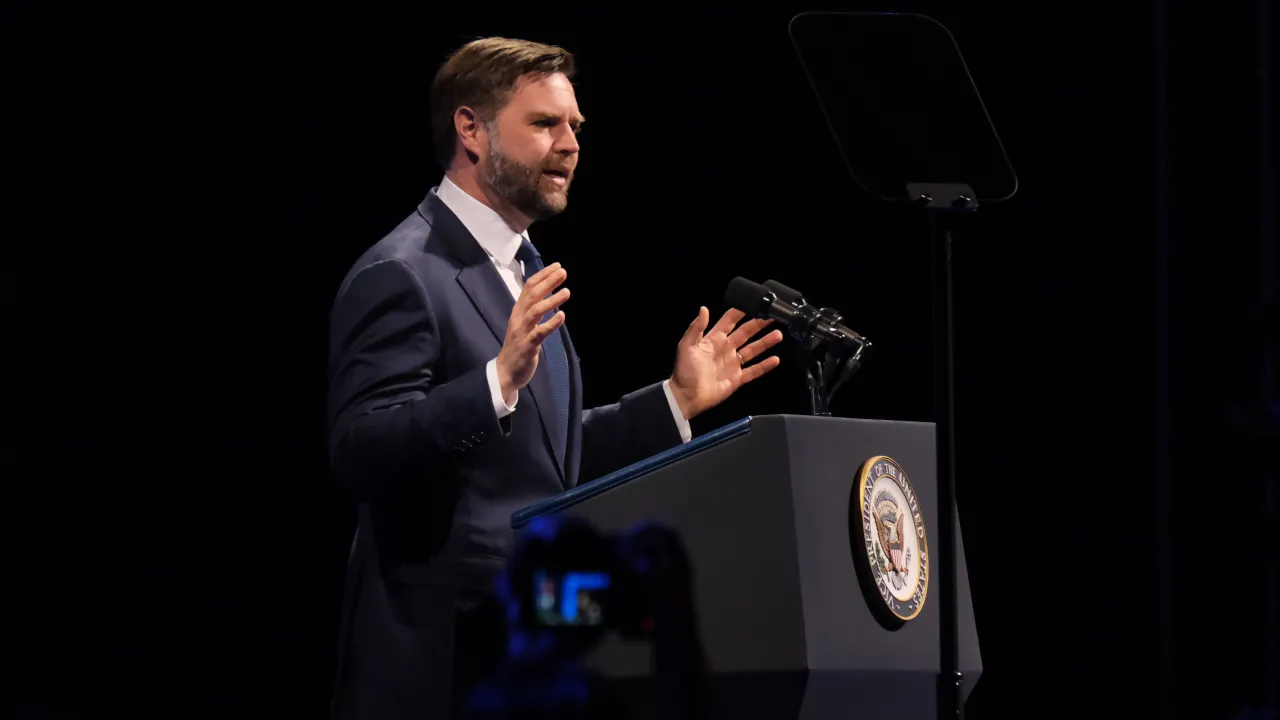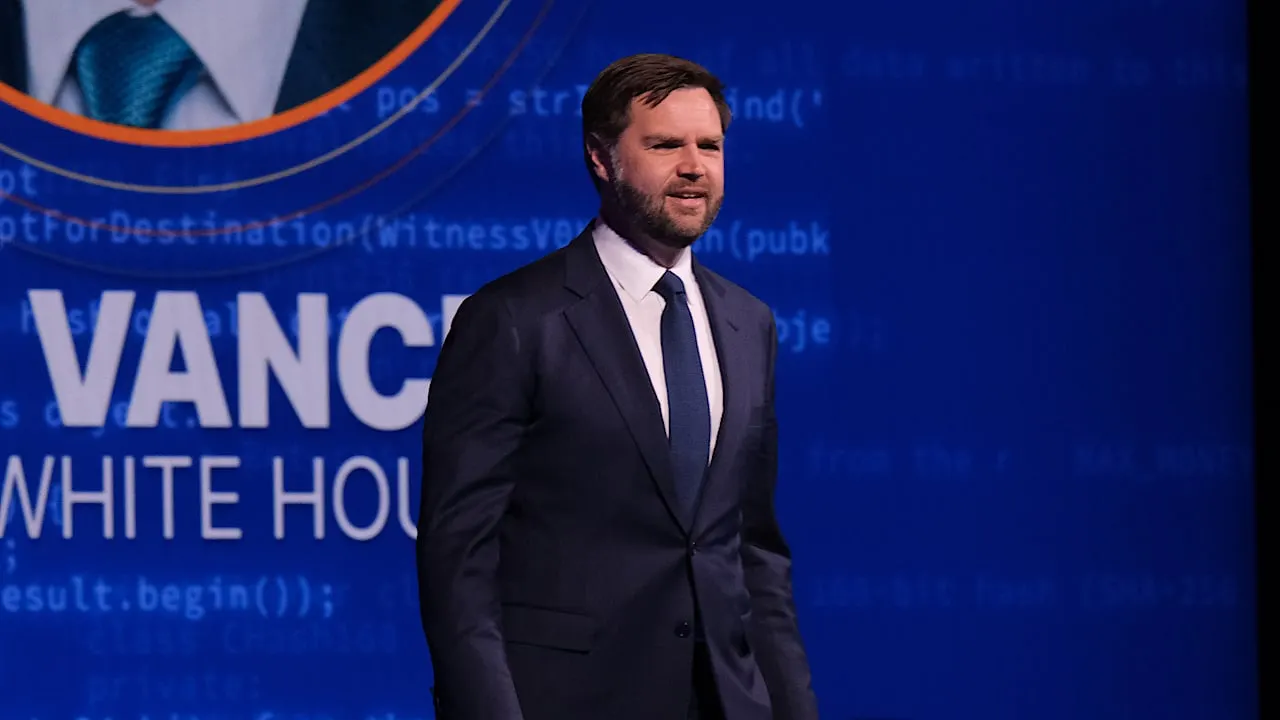In brief
- Vice President JD Vance gave a keynote address at the Bitcoin 2025 conference in Las Vegas.
- He reassured the crypto and digital assets community of its importance while outlining the future for crypto in America.
- Vance sees Bitcoin in particular being a strategic asset for the U.S. in the next decade.
Vice President JD Vance spoke at the Bitcoin 2025 conference in Las Vegas on Wednesday, headlining the event less than one year after President Donald Trump stood before a throng of Bitcoin supporters at Bitcoin 2024 in Nashville.
On the conference’s main stage, named after pseudonymous Bitcoin creator Satoshi Nakamoto, the VP opened by thanking the packed crowd of Bitcoin supporters and broader BTC community for helping him and Trump move “from candidacy to the White House.”
Vance used the rest of his time to reassure the digital assets community of its importance, and remind the crowd that it finally has a “champion and an ally in the White House.”
“In our administration, we understand the full potential of the digital assets industry—not just as an investment, not just as a flashy technology, but as a symbol and driver of personal liberty for all our citizens,” said Vance. “We are dedicated to seeing that promise fulfilled.”

According to the VP, that potential was hindered by the Biden administration, a point that he made clear multiple times throughout his keynote address, indicating the first substantive step to fulfilling crypto’s promise was by cleaning up the mess left before Trump took office.
“We’ve got to clean up the wreckage that the last administration left us, and since day one, that is exactly what we’ve been trying to do,” he said. “We’ve prioritized eliminating the rules, the red tape, and the lawfare that we saw aimed at crypto by our predecessors.”
Vance added that “maybe the most important thing we did for this community—we reject regulators and we fired Gary Gensler, and we’re going to fire everybody like him.”
Former SEC Chair Gary Gensler was not fired, though Trump had made threats of the sort on the campaign trail, last year. Instead, Gensler said last November—following Trump’s election win—that he would resign on inauguration day, January 20.
Vance added the next two substantive steps for supporting the crypto industry are creating a clear, pro-growth legal framework for stablecoins—making particular mention of the GENIUS Act—and enacting a transparent and tailored regulatory framework for digital assets.

“The consistent fear that I hear is that there’s still this perception that digital assets are not welcomed in the mainstream economy,” said Vance. “Let me promise you that our effort to change the policy is purely about changing that. We want our fellow Americans to know that crypto and digital assets—and particularly Bitcoin—are part of the mainstream economy and are here to stay.”
The VP’s speech was not filled with flashy promises like those President Trump shared in his time on the conference stage on the campaign trail last year, ultimately making good on his vow to establish a strategic Bitcoin reserve, among other crypto-friendly items, after being elected.
Even so, Vance made sure to reiterate crypto’s importance to a record-breaking Bitcoin conference crowd.
“Crypto is a hedge against bad policymaking from Washington, no matter what party is in control,” said Vance. “It’s a hedge against skyrocketing inflation, which has eroded the real savings rate of Americans over the last four years. And as you all know well, it’s a hedge against the private sector that’s increasingly willing to discriminate against consumers on the basis of their basic beliefs, including their politics.”
The VP’s political intertwinement with crypto isn’t quite as vast as the president’s, but his connection to the ecosystem existed well before his time on the presidential ticket.
His Bitcoin ownership disclosures in the Senate extend back to 2021, and in 2022, he spoke out about censorship, noting that crypto’s ascendence could be tied to concerns around losing banking access based on one’s political identity.
In 2023, he stuck to that message, introducing a bill that would shield crypto firms, as well as gun manufacturers and energy companies, from intense regulatory pressures.
Now he’s lockstep with Trump and the rest of a crypto-friendly administration that has eased regulatory hurdles for crypto firms while committing to an outspoken goal of becoming the world’s leader on crypto.
“Bitcoin is owned by about 50 million Americans. A lot of Americans have made a lot of money and created a lot of wealth for themselves, and that’s a great thing,” said Vance. “But I actually think that where Bitcoin is going, is as a strategically important asset for the United States over the next decade.”
“We want to start to put in motion the strategic importance of Bitcoin for the United States government,” he added.
Bitcoin is up slightly since Vance took the stage, but the top crypto asset is down 2.4% in the last 24 hours and is trading at $107,660.
Edited by Andrew Hayward
Daily Debrief Newsletter
Start every day with the top news stories right now, plus original features, a podcast, videos and more.

